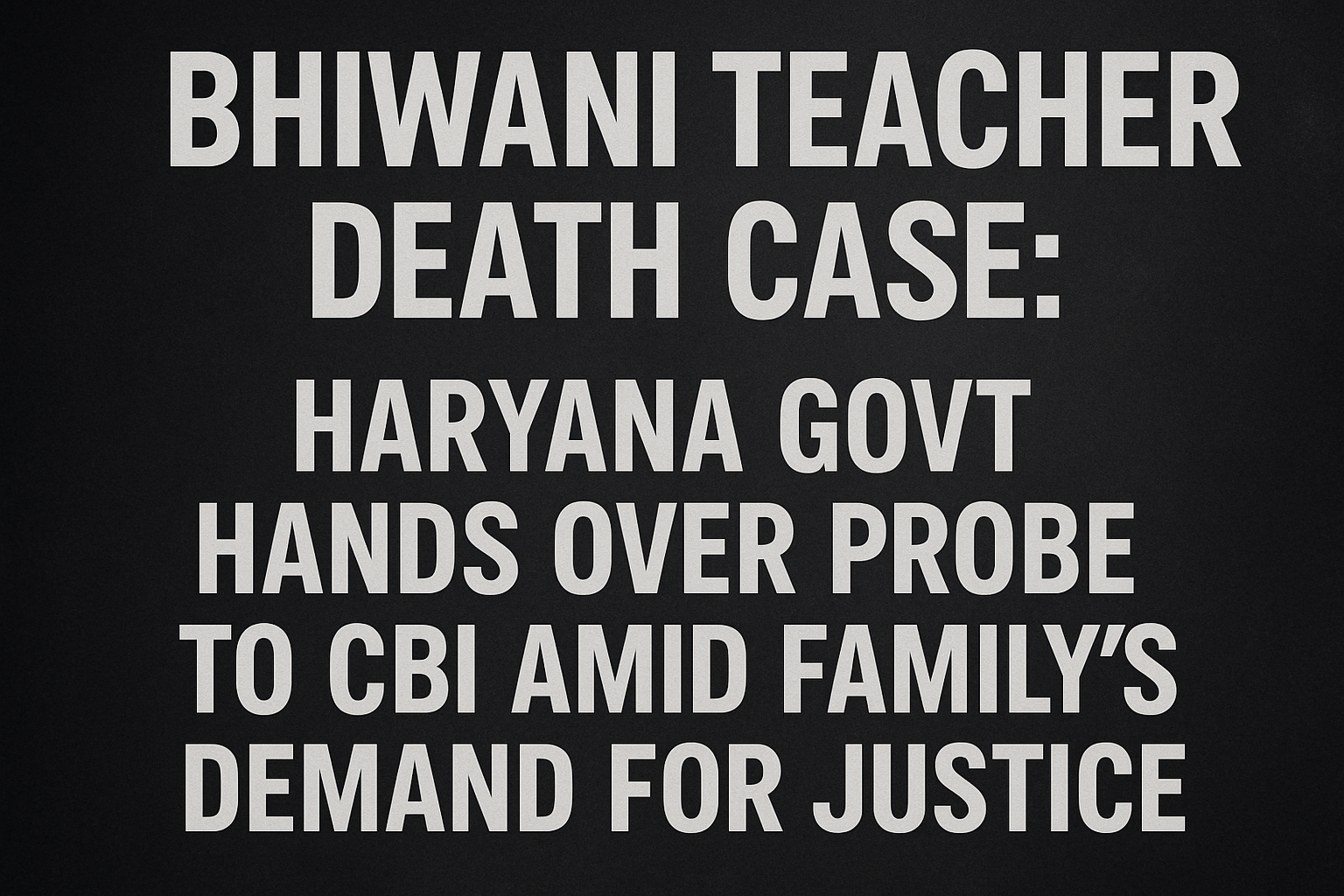The tragic death of Rajesh Kumar, a government school teacher from Bhiwani district, Haryana, has shaken the state and sparked a storm of protests. While police initially claimed it was a case of suicide, the victim’s family, colleagues, and local communities continue to reject this theory, alleging foul play and demanding a deeper probe. Responding to the public outcry, the Haryana government has now handed over the investigation to the Central Bureau of Investigation (CBI).
This development marks a turning point in a case that has been marred by conflicting narratives, unanswered questions, and growing anger on the streets.
Who Was Rajesh Kumar?
Rajesh Kumar, a respected teacher in Bhiwani, was known among students and colleagues for his dedication to education. He came from a well-regarded family and had no history that suggested he might take such a drastic step. His sudden death has therefore raised suspicions, especially since his family insists that he was under pressure from certain individuals in his professional and social circles.
Timeline of Key Events
- August 12, 2025 – Rajesh Kumar was found dead under circumstances police described as suicide.
- August 13, 2025 – The family refused to accept this version, staging a sit-in protest and demanding an FIR for murder.
- August 14–15, 2025 – Local teacher associations and community members joined the protests, leading to larger gatherings across Bhiwani.
- August 16, 2025 – The Haryana government announced that the case would be transferred to the CBI for independent investigation.
- Present – Protests continue, as the family rejects the suicide theory and insists that the truth behind Rajesh Kumar’s death be brought to light.
Why the Suicide Claim Is Being Rejected
The family argues that Rajesh Kumar had no personal or financial problems that could push him to take his own life. They allege that certain people in the local education and administrative network may have had conflicts with him, which need to be investigated. Protesters are calling the suicide claim a “cover-up attempt” and demanding that those responsible be identified and punished.
Political and Social Reactions
The incident has also drawn attention from political leaders and civil society groups across Haryana. Opposition parties have accused the government of failing to protect its employees and called for accountability. Teacher associations have warned that unless justice is delivered, they will escalate their protests to a state-wide level.
Community voices reflect both grief and anger:
- “He was a man who gave his life to teaching, not someone who would simply end it all. We want the truth,” said a family member during the protest.
- Local residents echoed the sentiment, pointing to gaps in the initial investigation and demanding full transparency.
Government’s Move to Involve the CBI
The Haryana government’s decision to involve the CBI is seen as a significant step, but skepticism remains. Families of victims in similar cases have often complained about delays or inconclusive results from central investigations. Protesters say they will continue to press for accountability and will not relent until the investigation clearly establishes responsibility.
Why This Case Resonates Beyond Bhiwani
The death of Rajesh Kumar has struck a chord across Haryana because it raises larger questions about workplace harassment, pressures on government employees, and transparency in law enforcement. The protests symbolize a wider frustration with how sensitive cases are often handled—with initial police statements being rejected by grieving families who demand independent scrutiny.
For many in Haryana, this case is no longer just about one teacher. It has become a fight for dignity, justice, and accountability in public service.
FAQs on the Bhiwani Teacher Case
Q1. Why has the Bhiwani case gained such wide attention in Haryana and beyond?
The case resonates because it reflects deeper questions about workplace dignity, women’s safety, and institutional accountability in government schools. Public anger is less about one incident and more about the fear that unresolved cases set a precedent for silence.
Q2. How does the CBI investigation change the direction of the case?
Unlike state police inquiries, a CBI investigation has wider powers: it can summon higher-level officials, use inter-agency forensic labs, and reopen dismissed leads. This creates a sense of reassurance among the public that no angle will be prematurely closed.
Q3. What role do teachers’ unions and associations play here?
Teachers’ bodies are not only demanding clarity in this case but also pushing for reforms in grievance redressal systems. They argue that if educators do not feel safe or heard in their workplaces, the broader education system suffers.
Q4. Could this case impact policy decisions in Haryana?
Yes. Public pressure could compel the government to strengthen mechanisms like workplace harassment committees, mental health support in schools, and independent hotlines for teachers. Past incidents in India have shown that high-profile cases often spark policy-level debates.
Q5. How has social media shaped the narrative of this case?
Unlike earlier decades where such incidents faded locally, today platforms like X (Twitter) and Instagram have amplified the story nationally. Hashtags and viral videos of protests have ensured the case cannot be quietly buried.
Q6. What unanswered questions remain at this stage?
Key gaps include the teacher’s last interactions, clarity on her professional environment, and whether she had raised complaints previously. These unanswered aspects fuel suspicion and underline the importance of a transparent inquiry.
Q7. Why is this case being compared to past controversial investigations in India?
Observers point out parallels with cases where initial suicide claims were later challenged—sometimes revealing systemic flaws or hidden coercion. This comparison intensifies demands that the truth in Bhiwani must not be left ambiguous.

